Tulalip Heritage Hawks took a win, 52-48, over Grace Academy Eagles in tonight’s game played at the Francy J. Sheldon Memorial Gymnasium at Heritage High School.
Watch a replay of tonight’s game on-demand at www.tulaliptv.com.
syəcəb
Tulalip Heritage Hawks took a win, 52-48, over Grace Academy Eagles in tonight’s game played at the Francy J. Sheldon Memorial Gymnasium at Heritage High School.
Watch a replay of tonight’s game on-demand at www.tulaliptv.com.
Tulalip Heritage Lady Hawks hosted the Grace Academy Eagles tonight and lost. Final score 4-49. You can watch a replay of the game on-demand at www.tulaliptv.com.
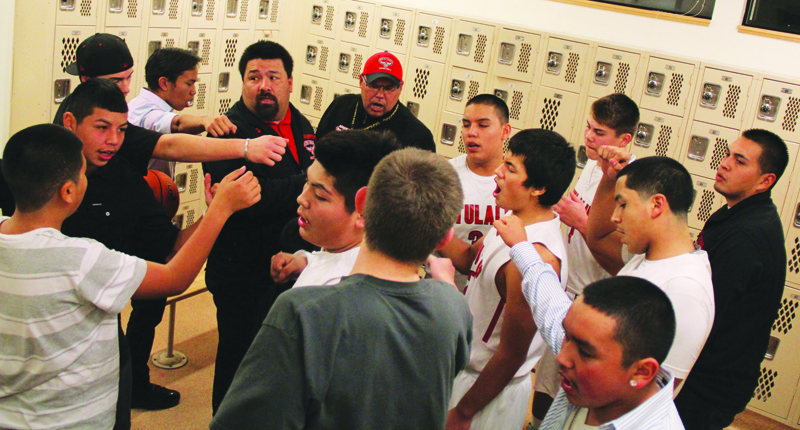
By Micheal Rios, Tulalip News
Coming off a very successful 26-1 season last year that saw the Hawks win a league championship, a district championship, and a tri-district championship, the expectations have been raised for our basketball program. It will be difficult to repeat the success of last year though, especially after losing so many senior players from last year’s team, most notably Northwest 1B League’s most valuable player Keanu Hamilton who is currently playing for Everett Community College.
This year’s Hawks team will consist of seniors Jesse Louie, Dontae Jones, Anthony McLean, Trevor Fryberg and Ayrik Miranda, along with juniors Robert Miles and Willy Enick. Coaches Marlin Fryberg and Cyrus “Bubba” Fryberg have both retained their coaching positions from last season.
The Tulalip Heritage Hawks boys basketball team kicked off their 2014-2015 season with a home opener vs. the Marysville-Pilchuck Tomahawks junior varsity team. The game would be a true testament to the skill and strategy of both players and coaches as the Hawks only dressed five players for the game, meaning there would be no substitutions and in the event a player fouled out the Hawks would be forced to play a man down. Prior to tip-off, coaches Fryberg stressed playing smart, hard-nosed defense, while being patient and focused on executing the offense.
In the opening quarter the Hawks shot a lowly 4 for 15 from the field for only 9 points, however junior standout Robert Miles scored 7 points in the quarter to keep the score close at 9-10. The Hawks made a point of emphasis to move the ball on the offensive end in the 2nd quarter. Spreading the floor and passing to the open man allowed the Hawks to catch fire. Jesse Louie and Willy Enick each had 3 assists in the quarter, while the team connecting on 8 of 10 shots from the field. However, the extra focus on offense didn’t carry over to the defensive end. The MP Tomahawks were shooting uncontested 3-pointers and jump shots, seemingly at will against the lackadaisical Hawks team defense. Luckily, for the Hawks, the Tomahawks were struggling to knock down their outside shots and the Hawks led the game 30-26 after the 2nd quarter.
During halftime the five Hawk players were visibly exhausted from playing the entire first half without any substitutions. The halftime intermission allowed them to get a rest, rehydrate, and go over second half adjustments. Coaches Marlin and Bubba Fryberg emphasized the lazy defense the Hawks had played in the first half, pointing out the game would not be close if the Hawks played the tough, aggressive style defense they are known for. Bottom line, the Hawks needed to pick up their defensive intensity to pull out the win.
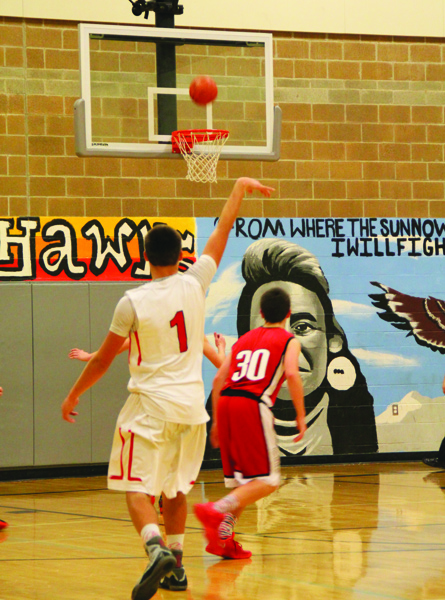
Message received. The Hawks came out of halftime and played their style of aggressive defense. They trapped the Tomahawk ball handlers, jumped the passing lanes, and hustled to every loose ball and rebound. Meanwhile Jesse Louie and Robert Miles attacked the basket at every opportunity, producing high efficient shots. The Hawks started the 3rd quarter on 9-2 run that led to a Tomahawk timeout, but the Tomahawk adjustments from that timeout didn’t work. The Hawks continued their relentless play and scored 14 unanswered points, putting them up 53-28. With 2 minutes remaining in the 3rd quarter, both teams traded a pair of buckets. In all, the 3rd quarter saw the Hawks outscore the MP Tomahawks 27-6 and enter the 4th quarter with a 57-32 lead.
The Hawks continued executing their offense to start the 4th quarter, and held a 66-40 lead with 4:21 left to play. With a Hawks victory clearly in sight the disadvantages of no bench players reared its ugly head. With 1:51 to play Trevor Fryberg fouled out of the game, forcing the Hawks to play 4-on-5. The MP Tomahawks, having the one man advantage, went on a 14-4 run from that point. Having built a 26 point lead the Hawks were easily able to overcome their lack of roster depth on this day. When the final game buzzer sounded the Hawks won their season opener 70-54.
Coach Bubba Fryberg said after the game, “That third quarter was the difference in the game. We put the pressure on high, we trapped, and everyone was moving. That’s the key. When we play defensively and everyone is moving we are going to be tough to beat. When we get a few more bodies here, a couple more kids get their grades up, then we are on the move. We are going to get better as we go.”
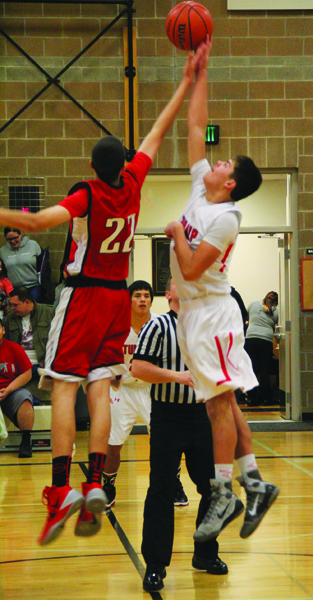
Key to the game: The Hawks dominant 27-6 3rd quarter.
Play of the game: In the 2nd quarter, Robert Miles pulled down a defensive rebound, went coast to coast, and drove through two Tomahawk defenders for a layup.
Coach’s corner: The Hawks need to cut down on turnovers. Had 23 tonight, including 10 in the 4th quarter.
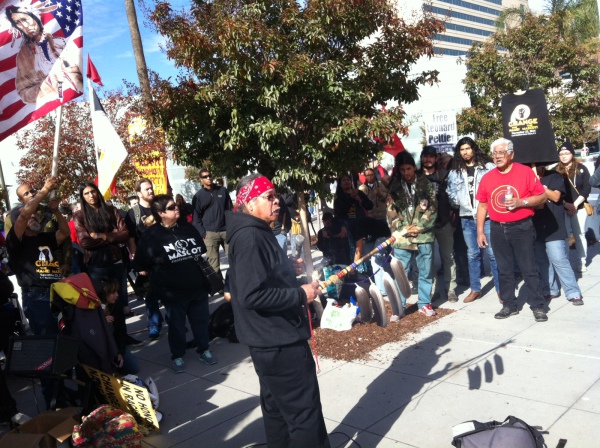
By Blu Wakpa, Native News Online , November 24, 2014
OCCUPIED TAMIEN OHLONE TERRITORY (Santa Clara, California) – After successful demonstrations in O’odham (Glendale, Arizona) and Dakota (Twin Cities, Minnesota), four-hundred Indigenous Peoples and their allies poured into Tamien in solidarity with a national grassroots campaign to change the name and mascot of the Washington NFL team. Traveling by carpool, Bay Area Rapid Transit (BART), and out-of-state flights, many amplified a growing voice for decolonization in sports.
The demonstration began at 8 a.m. with a prayer at one of many desecrated sacred sites (shell mounds and burial grounds) maintaining its indigenous Ohlone place name, Ulistac. According to Corrina Gould, a Karkin and Chochenyo Ohlone, Uli is the name of an Ohlone warrior who inhabited the area and stac refers to place/land. The prayer to the land and ancestors was followed by a march to Levi’s Stadium held prior to the game between San Francisco and Washington.
The peaceful event included a two-hour series of passionate and informed speeches from local, regional, and national activists, including people Indigenous to the area and upcoming leaders like Jacqueline Keeler of Eradicating Offensive Native Mascotry (EONM) and Dahkota Brown a 16-year-old Wilton Miwok student and founder of Native Education Raising Dedicated Students (NERDS). Elders who’ve inspired future generations also spoke on the topic, including Charlene Teeters and Clyde Bellecourt of the National Coalition on Racism in Sports and the Media (NCRSM).
Asian, African, and European people also educated fans by engaging, chanting, and holding picket signs and banners. Tribal African music blessed the event and recognized the similar histories between the African and Indigenous diaspora. Mexica (Aztec) dancers joined together in prayer, symbolizing the remembrance of the so-called Latino/Hispanic’s Indigeneity and pan-Indigenous interests across the colonial US-MX border.

Radio and television ads criticizing the nickname were aired throughout Ohlone and Miwok territories leading up to the game. Many broadcasters became allies when they chose not to mention Washington’s mascot. Audiences must understand the scalps of Indigenous Peoples were captured to collect bounties from the United States and expand White Supremacy outside of Europe.
Although Washington’s team owner, Dan Snyder, has vowed to “never change the name” and the NFL commissioner, Roger Goodell said earlier this year the nickname has been “presented in a way that honors Native Americans,” the demonstrations outside Levi’s Stadium and nationwide indicate Indigenous decolonization and self-determination is inevitable.
As fans passed the demonstration, many were quite surprised. “I’ve been a Washington fan for a long time and I’ve seen more resistance the last few years,” says Brian Jones, 35. He continued, “This demonstration helps me understand the mascot impacts actual people. It made me think about the other side of this issue.” John, 29, agreed saying, “When I see actual Native American’s are offended—I have to respect that.”
A die-hard Washington fan, Robert Magnini, 60, said, “I’ve been a fan since I was a kid. I think the name is offense and we need to change the name as soon as possible.”
Not all Indigenous Peoples agree, including Joseph Rey Potter, 14, who passed the demonstration wearing a Washington jersey and a Pomo baseball hat. “My Dad was a fan, so I just stayed with it. I understand it’s racist, but I’m just a fan of the game.” Potter concluded, “If they changed their name, I’d be a bigger fan.”
Kris Longoria and Antonio Gonzales, co-chairs of the Bay Area Coalition Against Racism in Sports and Media, said they will continue to escalate pressure on the NFL football team and build more partnerships with local organizations and government institutions.
Many urgent struggles exist across the Western Hemisphere and we must all do our part to challenge colonialism and honor Indigenous nations, leadership, and goals.
“PEOPLE SEE THIS ISSUE IS WINNABLE, ATTAINABLE, AND THEY BECOME EMPOWERED TO MOVE ONTO THE BIGGER ISSUES,” COMMENTED ANTONIO GONZALES.
A grandmother and her granddaughter appeared severely wounded, covered in bloody hair and hair buns held together with knives. “Redskin means someone whose been scalped, so me and my grandma put fake blood all over to show what a redskin means,” said Calissa Gali, 11. “None of my friends know what redskin means. They should learn at school, but some of the teachers don’t want to talk about it.”
Sacred Sites Protection & Rights of Indigenous Tribes (SSPRIT) has transferred the pain of another desecrated Ohlone Shell Mound in Karkin by decolonizing Vallejo High School’s Apaches and Solano Middle School’s Chieftains this year. The connections between appropriated sacred sites and stereotypes in sports are undeniable.
SSPRIT are now contractors, collaborating with students and administrators to educate about Indigenous mascots at school assemblies. Teacher training was also included in the negotiations to foster an integrated ethnic studies program across the school district. A duplication of this attainable model is also occurring with the Carquinez Coalition to Change the Mascot (CCCM) for John Swett High School Indians in Karkin (Crocket, CA).
Changing Washington’s name and mascot is not the end of changes to come. Colonization was several lifetimes of trauma and decolonization will take several lifetimes of healing. We envision post-colonialism. We’re not your mascot anymore.
Bay Area Coalition Against Racism in Sports is sponsored by American Indian Movement-West, Bay Area American Indian Two-Spirits, Eradicating Offensive Native Mascotry, Indian People Organizing for Change, Sacred Sites Protection & Rights of Indigenous Tribes, ANSWER Coalition, Idle No More SF Bay, and National Lawyers Guild San Francisco Bay Area Chapter. National ‘Change the Mascot’ supporters can be found at: http://www.changethemascot.org/supporters-of-change/
#NotYourMascot #ChangeTheName #ChangeTheMascot #NoHonorInRacism
Native News Online Photos by Arthur Jacobs
Invited to play basketball in Italy, Adiya Jones needs community support
By Brandi N. Montreuil, Tulalip News
TULALIP – Former Heritage High School Lady Hawk and Tulalip tribal member Adiya Jones is joining the ranks of Tulalip athletes who are showcasing their skills internationally. Jones, a junior at La Connor High School, has her sights set on Italian basketball courts, where she hopes to join an elite group of players from across the globe, to compete and test their skills while representing their countries. The only thing that can stop her isn’t fear, it’s fundraising.
Jones was nominated to join Team USA, which consists of 12 other girls selected from across the United States, by a coach who saw her play.
To help her raise the $4,000 needed by March 2, Jones has created a fundly.com account, which works like Gofundme, where people can donate funds to her cause or benefit, in Jones’s case, her trip to Italy.
The money she raises will pay for hotels and meals as Jones travels around Italy with Team USA. To guarantee her slot on the team, Jones is using the same type of dedication she shows on the court to fundraise as much as she can before the deadline. In addition to her fundly.com account she has created a lottery board where you can purchase one or more squares for a fee. If you choose the wining square number you win half the money the board generated.
“I need to have half the money by a certain date. I plan to use some of my Christmas bonus money to help. The Tribe is also going to help with matching funds I raise,” said Jones, who is also planning a spaghetti feed with the help of her grandmother to raise more funds. Jones will also be participating in the annual Tulalip Tribes All Native Thanksgiving Basketball Tournament, held November 28-30, to test and sharpen her court skills and hopefully do a little fundraising.
“I am excited but also nervous. Once we started the board I started to get really nervous, like, this is it,” said Jones about her anxiousness to travel abroad for the first time by herself.
Jones, who has aspirations to play basketball at Washington State University, said, “I am looking forward to meeting new people. Just the experience of getting to play basketball with a whole new team, and learning some new moves and about the culture is going to be amazing.”
To support Adiya’s fundraising attempts, please visit her fundly.com account at http://fundly.com/my-trip-to-italy.
Brandi N. Montreuil: 360-913-5402; bmontreuil@tulalipnews.com
By Brandi N. Montreuil, Tulalip News
MARYSVILLE – Tulalip Heritage Hawks took the field at Quil Ceda Stadium today in their last regular game of the season against the Clallam Bay Bruins, 82-60.
Taking the field for the first time since the October 24, Marysville-Pilchuck High School shooting, the Hawks returned to their home field, which is shared with MP’s Tomahawks, to end their season with an amazing display of skill and sportsmanship.
By Associated Press and KOMO News
RENTON, Wash. — The Seattle Seahawks welcomed the Marysville-Pilchuck High School football team to practice at their facility Tuesday following last week’s deadly shooting at the school.
Student Jaylen Fryberg opened fired at the school’s cafeteria on Friday, killing two students and injuring three others. Fryberg committed suicide.
Fryberg was a popular freshman who played football and was crowned homecoming royalty days before the shooting.
The Marysville-Pilchuck football team was scheduled to play against Oak Harbor high school in a district championship. After the shooting, Oak Harbor offered to take second place. On Monday, Seahawks coach Pete Carroll invited both teams.
Carroll called Oak Harbor’s gesture “extraordinary,” adding “we wish that we could do something to ease the pain of all the people that have been troubled.”
Mike Colebrese, executive director of the WIAA, the governing body for all high school sports, says practicing at the VMAC, a professional football facility, does not violate any rules or regulations.
“There is no violation of association of rules and regulations, they’re simply practicing in a facility that the Seahawks are gracious enough to offer,” said Colbrese. “Out of every tragedy there has to be some healing, and part of that healing is making sure we are paying attention to the community and the kids and I think that’s the important part here.”
A Seahawks spokesperson says Oak Harbor will practice at their facility later this week. Both Marysville and Oak Harbor have playoff games this weekend.
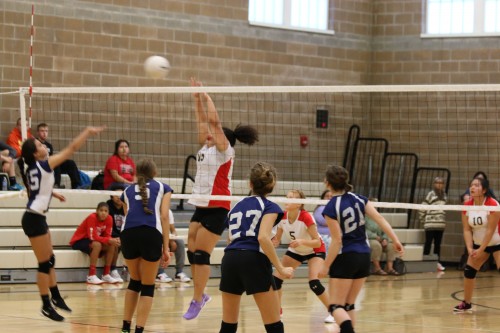
By Brandi N. Montreuil, Tulalip News
TULALIP – Tulalip Heritage Lady Hawks hosted the Providence Classical Christian Highlanders on Monday, October 20, at the Francy J. Sheldon Gymnasium at Heritage High School.
The Lady Hawks were up for a tough battle when they walked on the court to play the Northwest 1B varsity volleyball league’s top contender, having only lost two games this season.
Despite the lacking score, the Lady Hawks performance during the game is a far cry from their last two seasons under coach Amy Andrews. New head coach Raveon Harrowa has used her strong background in volleyball to create a team spirit within the Lady Hawks ranks. This has resulted in consistent communication during rallies, something Coach Andrews struggled to develop in the team.
While the Lady Hawks continue to seek their win, the team’s growth cannot be denied as sportsmanship and team spirit bring their own winning qualities to the young team.
Heritage Hawks – 12 10 9 – 0
Providence Classical – 25 25 25 – 3
You can watch all Heritage Lady Hawks home games on channel 99 on Tulalip Broadband or online at www.tulaliptv.com.
Brandi N. Montreuil: 360-913-5402; bmontreuil@tulalipnews.com
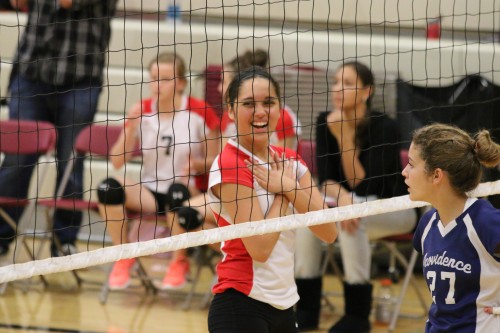
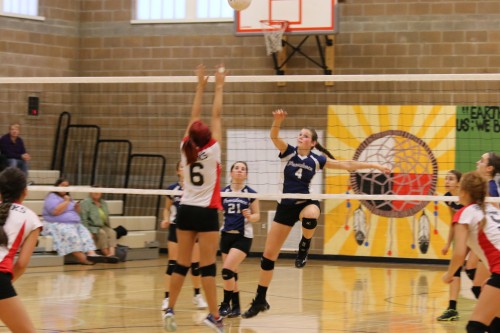
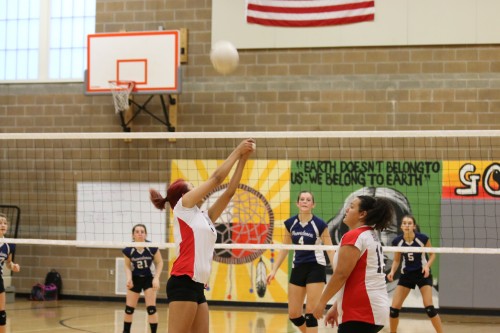
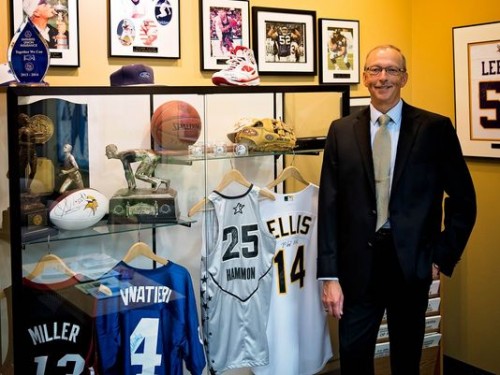
By Associated Press
SIOUX FALLS, S.D. (AP) – Finding referees for middle school games in communities on Native American reservations can sometimes be impossible in South Dakota.
In some cases, it’s even led to people getting pulled from the stands to call games, the Argus Leader reported Sunday. Emergency volunteers aren’t necessarily certified, which means they are less familiar with protocols when it comes to calling a fair contest, helping players learn a sport properly and handling games.
The South Dakota High School Activities Association in 2008 partnered with the Oglala Lakota College coach and athletic director Mary Tobacco to try to solve the problem. Together, they have developed a program to recruit and train Native American referees.
The program includes middle school basketball – the most popular sport in the area – volleyball and football. It involves 13 schools in two conferences. And this fall, a milestone will be reached when an all-Native American crew of referees participates in varsity football games in the region for the first time.
“We have to educate ourselves on the rules and get physically ready for the demands of fast play,” said Nick Hernandez, lead official in the all-Native American crew. “As a crew, we want to be prepared because the game has a lot of rules. We must be able to facilitate all those rules and provide a fair game.”
Activities Association executive director Wayne Carney said the lack of certified officials on reservations was especially problematic during the state tournament. He said foul numbers were lopsided because what was being called during regular season wasn’t consistent with the rules enforced during the state tourney.
Hernandez, a former high school player at Red Cloud, became certified about six years ago. He has been the coordinator of football officials in subvarsity games for the past three years, making game assignments.
Hernandez also is responsible for recruiting potential referees, and his efforts appear to be paying off: Twenty active men and women are on the basketball officiating list, up from less than five before the program kicked off.
Information from: Argus Leader, http://www.argusleader.com